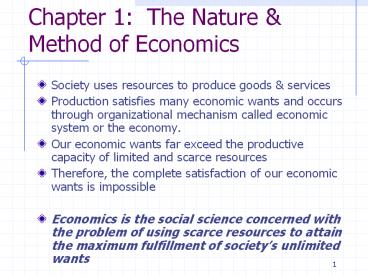Chapter 1: The Nature & Method of Economics - PowerPoint PPT Presentation
1 / 15
Title:
Chapter 1: The Nature & Method of Economics
Description:
Chapter 1: The Nature & Method of Economics Society uses resources to produce goods & services Production satisfies many economic wants and occurs through ... – PowerPoint PPT presentation
Number of Views:39
Avg rating:3.0/5.0
Title: Chapter 1: The Nature & Method of Economics
1
Chapter 1 The Nature Method of Economics
- Society uses resources to produce goods
services - Production satisfies many economic wants and
occurs through organizational mechanism called
economic system or the economy. - Our economic wants far exceed the productive
capacity of limited and scarce resources - Therefore, the complete satisfaction of our
economic wants is impossible - Economics is the social science concerned with
the problem of using scarce resources to attain
the maximum fulfillment of societys unlimited
wants
2
The Economic Perspective
- The economic perspective is the economic way of
thinking - Human property resources are scarce
- Goods services produced with those resources
are also scarce - Scarcity limits our options, we must make choices.
3
Rational Behavior
- Economics is grounded on the assumption of
rational self-interest - Achieve greatest satisfaction
- Rational behavior individuals make different
choices under different circumstances - Rational decisions change as costs and benefits
change - Self-interest behavior enables a person to
achieve personal satisfaction.
4
Marginalism Benefits Costs
- Economic perspective focuses on marginal
analysis, the comparison of marginal benefits and
marginal costs. - Marginal Extra, Additional
- Choices decisions involve changes in the
existing state of affairs (status quo) - When making choices rationally, compare marginal
benefits vs. marginal costs. - Marginal Benefit gt Marginal Cost
- Marginal Benefit Marginal Cost At the Margin
5
Why Study Economics?
- Economic Issues
- Unemployment
- Inflation
- Economic Growth
- Taxation
- Poverty
- International Trade
- Health Care
- Pollution
- Discrimination
- Immigration
- Education
6
Why Study Economics?
- Vital to Business
- An understanding of how to make economic
decisions and the operation of the economic
system enables business managers executives to
increase profit. - New technology
- Mergers Acquisitions
- Hire/Fire Employees
- Recessions
- Inflation
- Economics helps consumers and workers make better
buying, employment, financial decisions
7
Economic Methodology
- Economics relies on the Scientific Method
- Theoretical Economics Process of deriving
economic theories and principles is systematic,
involves fact-gathering and analysis ? generalize - Economic theories, principles, and laws are
generalizations relating to economic behavior or
the economy itself, expressed as tendencies of
the typical consumer, worker, or firm - Ceteris Paribus Other things being equal
8
Policy Economics
- Recognizes that theories and data can be used to
formulate policies - Policies are courses of action on economic
principles - Policies are intended to resolve a specific
economic problem or further an economic goal
9
Economic Goals
- Economic Growth Produce better goods
services Higher SOL - Full Employment Suitable jobs
- Economic Efficiency Maximize wants w/ available
Resources - Price-level Stability Avoid Inflation
Deflation - Economic Freedom
- Equitable Distribution of Income Reduce
Disparity between Poverty Abundance - Economic Security Minimum Levels of Income
- Balance of Trade Overall balance w/ ROW in
Trade Financial Transactions
10
Macroeconomics
- Macroeconomics examines the economy as a whole or
aggregates - Government, Household, Business Sectors
- Aggregate Collection of specific economic units
treated as one. - Macro seeks to obtain an overview
- E.g. Total Output, Employment, or Income
Aggregate Expenditures and General Level of
Prices
11
Microeconomics
- Microeconomics focuses on specific units of the
economy, observing details of an economic unit,
or small segment of the economy - Individual Industry, Firm, or Household
- E.g. Price of Single Product, EE at Single
Firm, Revenue/Income of Single Household
12
Positive Economics (What is)
- Positive economics focuses on facts and
cause-and-effect relationships - Avoids value judgments
- Tries to establish scientific statements about
economic behavior - Deals w/ what economy is actually like.
13
Normative Economics (What ought to be)
- Incorporates value judgments about what economy
should be like or what particular policy actions
should be recommended to achieve desired goal. - Most of the disagreement among economists
involves normative, value-based policy questions.
14
Pitfalls to Sound Reasoning
- Biases
- Loaded Terminology
- Definitions
- Fallacy of Composition
- Causation Fallacies
- Post Hoc Fallacy
- Correlation v. Causation (p. 11)
15
Chapter 1 Study Questions
- 4
- 10
- 11
- 12
- 13
- 14































